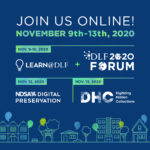 Though DLF is best known for our signature event, the annual DLF Forum, our working groups collaborate year round. Long before COVID-19 introduced the concept of “Zoom fatigue” into our lives, DLF’s working groups organized across institutional and geographical boundaries, building community while apart, to get work done. Made possible through the support of our institutional members, working groups are the efforts of a committed community of practitioners, using DLF as a framework for action, engaged in problem-solving in a variety of digital library subfields from project management and assessment to labor and accessibility.
Though DLF is best known for our signature event, the annual DLF Forum, our working groups collaborate year round. Long before COVID-19 introduced the concept of “Zoom fatigue” into our lives, DLF’s working groups organized across institutional and geographical boundaries, building community while apart, to get work done. Made possible through the support of our institutional members, working groups are the efforts of a committed community of practitioners, using DLF as a framework for action, engaged in problem-solving in a variety of digital library subfields from project management and assessment to labor and accessibility.
Once we decided that the 2020 DLF Forum and affiliated events would be held in a virtual format, it meant that our working groups wouldn’t have the opportunity to meet in person for their typical working meals that take place throughout the Forum; however, this year’s virtual format means that we’ll have more new DLF Forum attendees than ever before. Because DLF’s working groups are open to ALL, regardless of whether you’re affiliated with a DLF member institution or not, we asked leaders of the DLF working groups to introduce their groups and the work they do to the new and returning members of the #DLFvillage in a series of blogs and videos.
We’ll share these working group updates in the days leading to this year’s DLF Forum.
What is the DLF Digital Scholarship and Data Services Working Group?
The DLF Data and Digital Scholarship Working Group (DLFdds) is a continuation of two DLF groups: The eResearch Network and the Digital Scholarship Working Group. The current version of the group uses a mutual aid model to offer peer leaders and the group the ability to create topics of interest for the community. It is an evolution of the eResearch Network that DLF ran for many years.
Sara Mannheimer, Data Librarian, Montana State University and Jason Clark, Lead for Research Informatics, Montana State University will be facilitating the working group this year.
Our charge notes that we are “a community of practice focused on implementing research data and digital scholarship services. The group focuses on shared skill development, peer mentorship, networking, and collaboration. DLFdds aims to create a self-reliant, mutually supportive community: a network of institutions and individuals engaged in continuous learning about research data management, digital scholarship, and research support.”
Learn more about us:
Our Digital Scholarship and Data Services Wiki
Our Digital Scholarship and Data Services Google Group (listserv)
What are we working on?
We meet quarterly for discussion and activities based on DLF DDS community interest and ideas. Past topics have included: Advocacy and Promotion of Data Services and Digital Scholarship, Data Discovery/Metadata and Reusability, Collections as Data, Assessment (Metrics for success with Data Services and Digital Scholarship), etc.
Last month, we met to talk about roadmapping in a session led by Shilpa Rele
Scholarly Communication & Data Curation Librarian, Rowan University.

These sessions have a flexible focus between RDM and DS. These 90 minutes each quarter are structured around a particular topic and usually involve:
- A short visit from invited speaker on topic
- An in-session discussion and activity
We are basing this structure on the former eResearch Network (eRN) cohort model which had a more of a course-based mode. An example eResearch Network syllabus is linked here to give you some more perspective on the history of that group. Our new goal is to bring the best parts of eRN into this revitalized working group.
We also connect folks in the working group around consultation ideas. Consultations are working sessions that give consultees a chance to work through an in-depth, peer conversation to solve a local data services or digital scholarship question. Consultants are peers and associated experts (e.g. fellow DLFdds members, former eResearch Network participants, practitioners from other DLF member institutions). Consultations are flexible and customized according to consultee needs.
How to contribute or get involved?
As we are working to instill a mutual aid model for our community, we are interested in your ideas. We have opened a survey to pull together these interests and welcome your thoughts.
Take our DLF DDS Interest and Ideas Survey:
https://bit.ly/dlf-dds-survey
Beyond the survey, please feel free to join our Google Group as announcements and opportunities related to the WG and Digital Scholarship/Data Services in general will be available there.
Our next scheduled meeting will be in December 2020. We hope to see you there!
